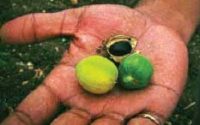Biodiesel feedstock-Jatropha seed
Jatropha curcas is originally a medicinal plant. Recently, it has been found that its seeds contain high oil content. It is one of the most studied energy plants in the world which can produce biodiesel. Jatropha curcas has high economic value and is recognized as a bioenergy tree in the world. Its seed kernel is the traditional soap and lubricating oil raw material, and has the purgative and emetic effect of tung tree seed, oil withered can be used as pesticide and fertilizer.

Jatropha curcas L. is a perennial drought-tolerant woody plant. It is suitable for planting in barren and marginal land. It has simple planting, extensive management and rapid growth. The Jatropha curcas L. forest can be put into production in 3 years and in full fruit period in 5 years. Fruit harvesting lasts for 50 years and the oil content of the fruit is 60-70%. The modified jatropha oil can be used in various diesel engines, and is superior to domestic zero diesel oil in key technologies such as flash point, solidification point, sulfur content, carbon monoxide emissions, particle size, etc. It meets Euro-2 emission standard and is called biodiesel. Trees are the most potential oil crop varieties. At present, the dry fruit yield of wild Jatropha curcas is 300 ~ 800kg/ mu, and the average yield is about 660kg/ mu.Pure jatropha oil can be used for cooking, lighting or power generation. A range of by-products include glycerin for cosmetics and reprocessed jatropha seed cakes that can be used as organic fertilizers. Its seed oil residue, residual oil residue and leaves can be used as pesticides. After detoxification, it can also be used as animal feed. Nitrogen rich seed oil residue is an excellent plant fertilizer.
Bio-oil technology is a traditional technology, but the production of bio-diesel from Jatropha curcas is a recent event. In 1995, with the support of the Rockefeller Fund and the German government, Brazil, Nepal and Zimbabwe began to develop jatropha oil as a fuel. India’s Planning Commission set up a leading group on biofuels in July 2002 to draft a national development plan for biodiesel. It plans to achieve the target of replacing 20% petroleum diesel with biodiesel by 2011-2012, by which time the Jatropha planting area will reach 5 million hectares. 2003-2007 is the stage of demonstration projects, during which the government, as the primary promoter, is responsible for the planning and operation of all links. The main work of this stage is to explore the problems and solutions in the links of planting, threshing, refining, transformation, blending, market development, product quality and system arrangement. 2003-2007 is the stage of demonstration projects, during which the government, as the primary promoter, is responsible for the planning and operation of all links. The main work of this stage is to explore the problems and solutions in the links of planting, threshing, refining, transformation, blending, market development, product quality and system arrangement. 2007-2012 is the stage of independent development and expansion of production. The goal is to achieve large-scale cultivation of Jatropha curcas and to expand the planting scope to the whole country so that enough vegetable oil can be produced to produce biodiesel. According to the road map, by 2007 India will produce 1.5 million tons of Jatropha seeds, extract 480,000 tons of Jatropha oil, create 124.4 million workers in the cultivation process and 36.8 million workers annually in the threshing process, lifting 550,000 rural households out of poverty.
On the one hand, the price control of refined oil makes it impossible for biodiesel producers to transfer the pressure of cost through price increase; on the other hand, compared with the EU, the United States and other countries and regions on the high subsidy and tax relief measures for biodiesel enterprises, China has no specific and operational industrial support policies and measures. Stage.
The industrial chain of biodiesel industry is composed of upstream raw materials and technologies, equipment suppliers, middle-stream biodiesel production enterprises, downstream gas stations, power plants, refineries, transportation companies, chemical enterprises and other customers. Oil plants, ditch oil recovery enterprises, oil distributors are the main raw materials of biodiesel industry. Material supplier. The equipment suppliers include Westfalia Food Technology Company of Germany, Melloni Group of Italy, Luzi Company of the United States, Energea Biodiesel Technology Company of Austria and other international well-known technology equipment suppliers, as well as some domestic professional oil equipment manufacturers, such as Henan Xiuwu Yongle Grain Machinery Group, Wuhan Science and Technology Xin. Valley Technology Co., Ltd., Wuxi Ruizhiyuan Biofuel Equipment Manufacturing Co., Ltd., Shanghai Zhongji Environmental Protection Technology Co., Ltd. Generally speaking, the quality of imported equipment is better, but the price is expensive, and the raw material requirements are more stringent, suitable for large-scale production enterprises; while the quality of domestic equipment is relatively poor, but the price is low, the adaptability of raw materials is also strong, suitable for small and medium-sized enterprises.
Compared with fossil diesel oil, jatropha oil is a green diesel oil. It is environmentally friendly (low sulfur content in Jatropha oil, 10 times lower SO2 and sulfide emissions than 0# diesel oil), has good start-up performance at low temperature (no additive condensation point up to – 20 C), and has strong lubrication function (low wear rate of injection pump, engine block and connecting rod, long service life). High safety performance (high flash point, not belonging to dangerous goods, convenient transportation and storage), good fuel performance (high cetane number, combustion performance is better than diesel oil, combustion residue is slightly acidic, so that the catalyst and engine oil life lengthened), and has regeneration.


